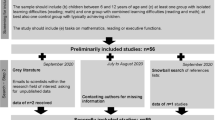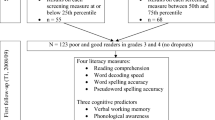Abstract
Several cognitive deficits associated with reading and mathematics problems have been identified. However, only few studies assessed the impact of these variables in children with combined problems in reading and arithmetics, and none of these studies included children with low IQ. This longitudinal study was designed to assess the impact of different cognitive variables as well as socioeconomic status on literacy and mathematics development of elementary school children with different kinds of learning problems and IQ levels over the course of 2 years. A total of six subgroups was selected from a total sample of 929 second-grade children, with the subgroups differing according to their IQ level and the type of learning disorder. The subgroups consisted of initially 24 reading disabled, 22 mathematics disabled, 35 combined, and 29 low- and 28 overachieving children, as well as 28 typically developing children. Participants were repeatedly assessed in regard to their literacy, mathematics, IQ as well as specific and general cognitive variables. Overall, reading problems were linked to deficits in phonological awareness, while mathematics problems were linked to memory and attention deficits. Children with combined problems showed additive deficits in phonological awareness and attention. The same applied for low-achieving children who were additionally characterized by low socioeconomic status. Good phonological awareness served as a protective factor in overachieving children. The correlation of cognitive variables and group membership was more pronounced at the end of elementary school than in grade 2. Our results confirm an additive approach of cognitive deficits in children with combined learning problems. Phonological awareness constitutes not only a risk factor for learning problems but also a protective factor for good academic achievement in children with low IQ.
Similar content being viewed by others
References
Ashkenazi, S., Black, J. M., Abrams, D. A., Hoeft, F., & Menon, V. (2013). Neurobiological underpinnings of math and reading learning disabilities. Journal of Learning Disabilities, 46(6), 549–569. doi:10.1177/0022219413483174.
Badian, N. A. (1983). Dyscalculia and nonverbal disorders of learning. In H. R. Myklebust (Ed.), Progress in learning disabilities (Vol. 5, pp. 235–264). New York: Stratton.
Badian, N. A. (1999). Reading disability defined as a discrepancy between listening and reading comprehension: a longitudinal study of stability, gender differences, and prevalence. Journal of Learning Disabilities, 32(2), 138–148. doi:10.1177/002221949903200204.
Branum-Martin, L., Fletcher, J. M., & Stuebing, K. K. (2012). Classification and identification of reading and math disabilities: the special case of comorbidity. Journal of Learning Disabilities. doi:10.1177/0022219412468767.
Brown Waesche, J. S., Schatschneider, C., Maner, J. K., Ahmed, Y., & Wagner, R. K. (2011). Examining agreement and longitudinal stability among traditional and RTI-based definitions of reading disability using the affected-status agreement statistic. Journal of Learning Disabilities, 44(3), 296–307. doi:10.1177/0022219410392048.
Cirino, P. T., Fletcher, J. M., Ewing Cobbs, L., Barnes, M. A., & Fuchs, L. S. (2007). Cognitive arithmetic differences in learning difficulty groups and the role of behavioral inattention. Learning Disabilities Research & Practice, 22(1), 25–35.
De Smedt, B., Holloway, I. D., & Ansari, D. (2011). Effects of problem size and arithmetic operation on brain activation during calculation in children with varying levels of arithmetical fluency. NeuroImage, 57(3), 771–781. doi:10.1016/j.neuroimage.2010.12.037.
Döpfner, M., Görtz-Dorten, A., Lehmkuhl, G., Breuer, D., & Goletz, H. (2008). Diagnostik-System für psychische Störungen nach ICD-10 und DSM-IV für Kinder und Jugendliche-II (DISYPS-II). Bern: Huber.
Ganzeboom, H. B. G., De Graaf, P. M., & Treiman, D. J. (1992). A standard international socioeconomic index of occupational status. Social Science Research, 21(1), 1–56.
Gathercole, S. E., Alloway, T. P., Willis, C., & Adams, A.-M. (2006). Working memory in children with reading disabilities. Journal of Experimental Child Psychology, 93(3), 265–281. doi:10.1016/j.jecp.2005.08.003.
Geary, D. C., Hamson, C. O., & Hoard, M. K. (2000). Numerical and arithmetical cognition: a longitudinal study of process and concept deficits in children with learning disability. Journal of Experimental Child Psychology, 77(3), 236–263. doi:10.1006/jecp.2000.2561.
Geary, D. C., Hoard, M. K., Byrd-Craven, J., Nugent, L., & Numtee, C. (2007). Cognitive mechanisms underlying achievement deficits in children with mathematical learning disability. Child Development, 78(4), 1343–1359.
Haffner, J., Baro, K., & Parzer, P. (2005). Heidelberger Rechentest (HRT 1-4). Erfassung mathematischer Basiskompetenzen im Grundschulalter. Göttingen: Hogrefe.
Hasselhorn, M., Schumann-Hengsteler, R., Gronauer, J., Grube, D., Mähler, C., Schmid, I., et al. (2012). Arbeitsgedächtnisbatterie für Kinder von 5 bis 12 Jahren (AGTB 5-12). Göttingen: Hogrefe.
Jordon, N. C., Kaplan, D., & Hanich, L. B. (2002). Achievement growth in children with learning difficulties in mathematics: findings of a two-year longitudinal study. Journal of Educational Psychology, 94(3), 586–597. doi:10.1037//0022-0663.94.3.586.
Krajewski, K., & Schneider, W. (2009). Early development of quantity to number-word linkage as a precursor of mathematical school achievement and mathematical difficulties: findings from a four-year longitudinal study. Learning and Instruction, 19(6), 513–526. doi:10.1016/j.learninstruc.2008.10.002.
Küspert, P., & Schneider, W. (1998). Würzburger Leise Leseprobe (WLLP). Ein Gruppenlesetest für die Grundschule. Göttingen: Hogrefe.
Landerl, K., & Moll, K. (2010). Comorbidity of learning disorders: prevalence and familial transmission. Journal of Child Psychology and Psychiatry, 51(3), 287–294. doi:10.1111/j.1469-7610.2009.02164.x.
Landerl, K., Fussenegger, B., Moll, K., & Willburger, E. (2009). Dyslexia and dyscalculia: two learning disorders with different cognitive profiles. Journal of Experimental Child Psychology, 103(3), 309–324. doi:10.1016/j.jecp.2009.03.006.
Mabbott, D. J., & Bisanz, J. (2008). Computational skills, working memory, and conceptual knowledge in older children with mathematics learning disabilities. Journal of Learning Disabilities, 41(1), 15–28. doi:10.1177/0022219407311003.
Miles, T. R., & Miles, E. (1992). Dyslexia and mathematics. New York: Guilford.
Passolunghi, M. C., & Mammarella, I. C. (2012). Selective spatial working memory impairment in a group of children with mathematics learning disabilities and poor problem-solving skills. Journal of Learning Disabilities. doi:10.1177/0022219411400746.
Pennington, B. F. (2006). From single to multiple deficit models of developmental disorders. Cognition, 101(2), 385–413. doi:10.1016/j.cognition.2006.04.008.
Preßler, A.-L., Könen, T., Hasselhorn, M., & Krajewski, K. (2014). Cognitive preconditions of early reading and spelling: a latent-variable approach with longitudinal data. Reading and Writing, 27(2), 383–406. doi:10.1007/s11145-013-9449-0.
Purvis, K. L., & Tannock, R. (2000). Phonological processing, not inhibitory control, differentiates ADHD. Jaac, 39(4), 485–494. doi:10.1097/00004583-200004000-00018.
Schneider, W., & Näslund, J. C. (1999). Impact of early phonological processing skills on reading and spelling in school: evidence from the Munich Longitudinal Study. In F. E. Weinert & W. Schneider (Eds.), Individual development from 3 two 12: Findings from the Munich Longitudinal Study (pp. 126–147). Cambridge: Cambridge University Press.
Silver, C. H., Deborah-Lynne Pennett, H., Black, J. L., Fair, G. W., & Balise, R. R. (1999). Stability of arithmetic disability subtypes. Journal of Learning Disabilities, 32(2), 108–119. doi:10.1177/002221949903200202.
Sinner, D., Ennemoser, M., & Krajewski, K. (2011). Entwicklungspsychologische Frühdiagnostik mathematischer Basiskompetenzen im Kindergarten- und frühen Grundschulalter (MBK-0 und MBK-1). In M. Hasselhorn & W. Schneider (Eds.), Frühprognose schulischer Kompetenzen (pp. 109–126). Göttingen: Hogrefe.
Stock, C., & Schneider, W. (2008a). Deutscher Rechtschreibtest für das dritte und vierte Schuljahr (DERET 3-4+). Göttingen: Hogrefe.
Stock, C., & Schneider, W. (2008b). Deutscher Rechtschreibtest für das erste und zweite Schuljahr (DERET 1-2+). Göttingen: Hogrefe.
Stock, C., Marx, P., & Schneider, W. (2003). Basiskompetenzen für Lese-Rechtschreibleistungen (BAKO 1-4). Göttingen: Hogrefe.
Szucs, D., Devine, A., Soltesz, F., Nobes, A., & Gabriel, F. (2013). Developmental dyscalculia is related to visuo-spatial memory and inhibition impairment. Cortex, 49(10), 2674–2688. doi:10.1016/j.cortex.2013.06.007.
van der Sluis, S., de Jong, P. F., & Leij, A. V. D. (2004). Inhibition and shifting in children with learning deficits in arithmetic and reading. Journal of Experimental Child Psychology, 87(3), 239–266. doi:10.1016/j.jecp.2003.12.002.
Vellutino, F. R., Fletcher, J. M., Snowling, M. J., & Scanlon, D. M. (2004). Specific reading disability (dyslexia): what have we learned in the past four decades? Journal of Child Psychology and Psychiatry, 45(1), 2–40.
Vukovic, R. K., Lesaux, N. K., & Siegel, L. S. (2010). The mathematics skills of children with reading difficulties. Learning and Individual Differences, 20(6), 639–643. doi:10.1016/j.lindif.2010.08.004.
Weiß, R., & Osterland, J. (1997). Grundintelligenztest Skala 1. CFT 1. Handanweisung für die Durchführung, Auswertung und Interpretation (5th ed.). Braunschweig: Westermann.
Willcutt, E., Sonuga-Barke, E., Nigg, J., & Sergeant, J. (2008). Recent developments in neuropsychological models of childhood psychiatric disorders. Advances in Biological Psychiatry, 24, 195–226.
Willcutt, E. G., Petrill, S. A., Wu, S., Boada, R., DeFries, J. C., Olson, R. K., & Pennington, B. F. (2013). Comorbidity between reading disability and math disability: concurrent psychopathology, functional impairment, and neuropsychological functioning. Journal of Learning Disabilities, 46(6), 500–516. doi:10.1177/0022219413477476.
Acknowledgment
This research was supported by a grant from the German Research Foundation (DFG; GZ SCHN 315/39-1) to Wolfgang Schneider and Christina Schwenck. We are grateful to Marcus Hasselhorn and Karin Landerl for their valuable suggestions concerning the design of this research project.
Author information
Authors and Affiliations
Corresponding author
Additional information
Christina Schwenck. Department of Psychology, Justus-Liebig University Gießen, Otto-Behaghel-Straße 10, 35394 Gießen, Germany. E-mail: christina.schwenck@kgu.de
Current themes of research:
Cognitive and Socio-emotional Development. Developmental Psychopathology
Most relevant publications in the field of Psychology of Education:
Schwenck, C., Göhle, B., Hauf, J., Warnke, A., Freitag, C.M. & Schneider, W. (2014). Cognitive and emotional empathy in typically developing children: The influence of age, gender, and intelligence. European Journal of Developmental Psychology, 23 (1), 13–22.
Friederike Dummert. Department of Psychology, University of Würzburg, Würzburg, Germany
Current themes of research:
Cognitive Development. Learning Disorders
Most relevant publications in the field of Psychology of Education:
Dummert, F., Endlich, D., Schneider, W. & Schwenck, C. (2014). Entwicklung schriftsprachlicher und mathematischer Leistungen bei Kindern mit und ohne Migrationshintergrund. Zeitschrift für Entwicklungspsychologie und Pädagogische Psychologie, 46 (3), 115–132.
Endlich, D., Dummert, F., Schneider, W. & Schwenck, C. (2014). Verhaltensprobleme bei Kindern mit umschriebener und kombinierter schulischer Minderleistung. Kindheit und Entwicklung, 23 (1), 61–69.
Darius Endlich. Department of Psychology, University of Würzburg, Würzburg, Germany
Current themes of research:
Cognitive Development. Developmental Psychopathology
Most relevant publications in the field of Psychology of Education:
Endlich, D., Dummert, F., Schneider, W. & Schwenck, C. (2014). Verhaltensprobleme bei Kindern mit umschriebener und kombinierter schulischer Minderleistung. Kindheit und Entwicklung, 23 (1), 61–69.
Dummert, F., Endlich, D., Schneider, W. & Schwenck, C. (2014). Entwicklung schriftsprachlicher und mathematischer Leistungen bei Kindern mit und ohne Migrationshintergrund. Zeitschrift für Entwicklungspsychologie und Pädagogische Psychologie, 46 (3), 115–132.
Wolfgang Schneider. Department of Psychology, University of Würzburg, Würzburg, Germany
Current themes of research:
Memory Development. Metacognition. Dyslexia. The Influence of Media on Reading Development
Most relevant publications in the field of Psychology of Education:
Schneider, W: Metacognitive development: Educational implications. In: International Enzyclopedia of the Social and Behavioral Sciences (2nd ed., Area 9). Elsevier, New York (in press)
Rights and permissions
About this article
Cite this article
Schwenck, C., Dummert, F., Endlich, D. et al. Cognitive functioning in children with learning problems. Eur J Psychol Educ 30, 349–367 (2015). https://doi.org/10.1007/s10212-014-0242-5
Received:
Revised:
Accepted:
Published:
Issue Date:
DOI: https://doi.org/10.1007/s10212-014-0242-5




